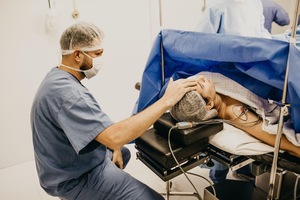Introduction
Medical mistakes are more common than we’d like to think. They can happen in various forms, from misdiagnosis to incorrect prescriptions or surgical errors, and they often leave https://privatebin.net/?82f888f402dc6030#BPXohkFw1s8bMZFnwNToFNw74LWf5cxjLCkQQwtoCsTw patients feeling lost, betrayed, and vulnerable. In this guide, we will delve into the nuances of coping with these unfortunate situations. Whether you're a patient grappling with the fallout or a family member trying to support a loved one, understanding how to navigate this difficult terrain is crucial.
When faced with medical negligence, it's vital to seek assistance not just from healthcare professionals but also from legal experts. Enter medical negligence lawyers and malpractice attorneys—professionals who specialize in helping patients reclaim their lives after experiencing medical errors. This article aims to empower you with knowledge and strategies for dealing with the aftermath of such mistakes.
Coping with the Aftermath of Medical Mistakes: A Patient’s Guide
Dealing with medical mistakes can be emotionally taxing. The first step towards recovery is acknowledging the pain and trauma you've experienced. Understanding what happened can help you process your feelings better, allowing you to regain control over your life.
Understanding Medical Mistakes
What Constitutes a Medical Mistake?
A medical mistake occurs when a healthcare provider's actions lead to preventable harm. This could include:
- Misdiagnosis: When a doctor identifies an illness incorrectly. Surgical errors: Such as performing surgery on the wrong body part. Medication errors: Misprescribing drugs or dosages. Failure to monitor: Not keeping an eye on critical patient data during treatment.
Recognizing these types of mistakes is essential for seeking justice and healing.
Why Do Medical Errors Occur?
Medical errors can stem from various factors:
- Communication Failures: Lack of clear communication among medical staff. Overworked Staff: High patient loads leading to lapses in care. Inadequate Training: Insufficient preparation for complex procedures.
Understanding these causes may not ease your pain but can help clarify that such issues often stem from systemic problems rather than personal negligence alone.
Identifying Your Feelings
Emotional Toll of Medical Errors
Experiencing a medical mistake can evoke an array of emotions, including:
- Anger: Directed at healthcare providers or yourself for trusting them. Sadness: Mourning what could have been if proper care was provided. Confusion: Struggling to make sense of what went wrong.
It’s natural to feel overwhelmed by these emotions. Recognizing them is the first step toward healing.
Seeking Psychological Support
Consider speaking with a mental health professional specializing in trauma or grief counseling. They can provide valuable coping mechanisms tailored specifically for your situation.
Legal Rights Post-Medical Errors
Understanding Your Legal Options
If you've suffered due to a medical mistake, you may wonder about your options for seeking justice:
Consulting a Medical Malpractice Attorney: These professionals specialize in assisting victims of medical negligence. They’ll analyze your case thoroughly.

Filing a Claim: If warranted, your attorney will help you file a claim against the responsible party.
Compensation: Victims may be entitled to compensation covering medical bills, lost wages, and emotional suffering.
Finding the Right Medical Malpractice Lawyer
Qualities to Look For
When searching for an attorney specializing in malpractice cases, consider:
- Experience: Look for someone with relevant experience handling similar cases. Transparency: Choose an attorney who communicates openly about potential outcomes and fees.
Questions to Ask Potential Lawyers
Before hiring an attorney, ask questions like:
- What is your experience with cases similar to mine? What are your fees, and how do you structure payment?
These inquiries can give you confidence in choosing the right lawyer.
Building Your Case
Gathering Evidence
To build a strong case against possible negligence, gather relevant documents such as:
Medical records Bills related to treatment Personal journals detailing symptoms and experiencesThis information will be invaluable in proving your claims.
Documentation Tips
Keep all correspondence related to your case organized:
| Document Type | Description | |---------------------|------------------------------------| | Medical Records | Records from all healthcare providers involved | | Bills | All invoices associated with treatment | | Personal Journal | Notes regarding symptoms and emotional impact |
Navigating Insurance Challenges
Understanding Insurance Policies
Insurance companies may complicate matters further after a medical mistake occurs. Familiarize yourself with terms such as “coverage limits” and “deductibles.”
Key Insurance Terms Explained
| Term | Definition | |---------------------|------------------------------------------| | Coverage Limit | The maximum amount an insurer will pay | | Deductible | Amount you need to pay before insurance kicks in |
The Role of Patient Advocacy Groups
Finding Support Networks
Consider joining patient advocacy groups that specialize in supporting individuals affected by medical errors. These organizations provide resources like counseling services and legal advice while connecting you with others who've had similar experiences.
Coping Mechanisms for Patients
Mindfulness Techniques
Practicing mindfulness can help ground you during tumultuous times:
Deep breathing exercises Guided meditations Journaling thoughts and feelings
These techniques can improve emotional resilience while navigating challenges ahead.
Reclaiming Your Health After Trauma
Physical Rehabilitation
Depending on the nature of the error, physical rehabilitation might be necessary:
- Engage licensed therapists who specialize in rehabilitative care tailored just for you.
Holistic Approaches
Consider exploring holistic treatments like acupuncture or yoga that promote overall well-being while fostering recovery from psychological distress.
FAQs About Coping With Medical Mistakes
What should I do immediately after realizing I've experienced a medical mistake?- Document everything related to your treatment right away; gather evidence like notes and bills that indicate what occurred.
- Look at their background experience, ask about previous cases they’ve handled successfully, and check reviews from other clients online.
- Yes! Many cases settle out of court through negotiations between lawyers before reaching litigation stages.
- You may claim damages covering all medical expenses incurred because of negligence along with compensation for lost wages or emotional distress suffered as well.
- Resolution time varies widely depending on case complexity but generally takes several months up until years if litigation becomes necessary!
- Each state has its own statute of limitations regarding filing claims; consult an attorney promptly!
Conclusion
Coping with the aftermath of medical mistakes is undoubtedly challenging; however, understanding your rights coupled with effective coping strategies can pave the way toward healing both physically and emotionally after such traumatic events occur! Remember always—you're not alone! Reach out for support whenever needed whether through friends & family members or professionals dedicated specifically toward helping individuals navigate these trying times successfully! Don’t hesitate either – consult qualified legal counsel today so they’ll guide you through reclaiming what’s yours while holding accountable those who’ve caused harm unnecessarily! In summary— Coping with the Aftermath of Medical Mistakes: A Patient’s Guide serves as more than just practical advice—it empowers individuals living through adversity back into their rightful positions within society!
